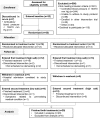A randomized trial of dietary sodium restriction in CKD
- PMID: 24204003
- PMCID: PMC3839553
- DOI: 10.1681/ASN.2013030285
A randomized trial of dietary sodium restriction in CKD
Abstract
There is a paucity of quality evidence regarding the effects of sodium restriction in patients with CKD, particularly in patients with pre-end stage CKD, where controlling modifiable risk factors may be especially important for delaying CKD progression and cardiovascular events. We conducted a double-blind placebo-controlled randomized crossover trial assessing the effects of high versus low sodium intake on ambulatory BP, 24-hour protein and albumin excretion, fluid status (body composition monitor), renin and aldosterone levels, and arterial stiffness (pulse wave velocity and augmentation index) in 20 adult patients with hypertensive stage 3-4 CKD as phase 1 of the LowSALT CKD study. Overall, salt restriction resulted in statistically significant and clinically important reductions in BP (mean reduction of systolic/diastolic BP, 10/4 mm Hg; 95% confidence interval, 5 to 15 /1 to 6 mm Hg), extracellular fluid volume, albuminuria, and proteinuria in patients with moderate-to-severe CKD. The magnitude of change was more pronounced than the magnitude reported in patients without CKD, suggesting that patients with CKD are particularly salt sensitive. Although studies with longer intervention times and larger sample sizes are needed to confirm these benefits, this study indicates that sodium restriction should be emphasized in the management of patients with CKD as a means to reduce cardiovascular risk and risk for CKD progression.
Figures





Comment in
-
Sodium reduction in CKD: suggestively hazardous or intuitively advantageous?J Am Soc Nephrol. 2013 Dec;24(12):1931-3. doi: 10.1681/ASN.2013090923. Epub 2013 Nov 7. J Am Soc Nephrol. 2013. PMID: 24204000 Free PMC article. No abstract available.
References
-
- Go AS, Chertow GM, Fan D, McCulloch CE, Hsu CY: Chronic kidney disease and the risks of death, cardiovascular events, and hospitalization. N Engl J Med 351: 1296–1305, 2004 - PubMed
-
- Agrawal V, Marinescu V, Agarwal M, McCullough PA: Cardiovascular implications of proteinuria: An indicator of chronic kidney disease. Nat Rev Cardiol 6: 301–311, 2009 - PubMed
-
- Vanholder R, Massy Z, Argiles A, Spasovski G, Verbeke F, Lameire N, European Uremic Toxin Work Group : Chronic kidney disease as cause of cardiovascular morbidity and mortality. Nephrol Dial Transplant 20: 1048–1056, 2005 - PubMed
-
- Basile JN: Recognizing the link between CKD and CVD in the primary care setting: Accurate and early diagnosis for timely and appropriate intervention. South Med J 100: 499–505, 2007 - PubMed
-
- Thijssen S, Kitzler TM, Levin NW: Salt: Its role in chronic kidney disease. J Ren Nutr 18: 18–26, 2008 - PubMed
Publication types
MeSH terms
Substances
LinkOut - more resources
Full Text Sources
Other Literature Sources
Medical

